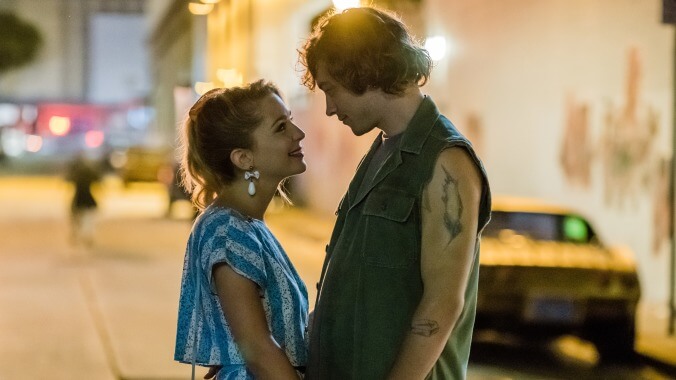The new musical Valley Girl captures the neon but misses the fun of the ’80s original


The original Valley Girl became a sleeper hit in 1983. Despite the then-no-name cast, ’80s teens flocked to the Romeo And Juliet story of Randy and Julie, a punk rocker and a preppy girl who fall for each other despite entrenched social barriers. In his first starring role, Nicolas Cage made an indelible impact as the besotted, faux-hawked Randy, who easily sweeps Deborah Foreman’s mini-skirt-sporting Julie off her feet; the fact that the two actors were dating at the time helps account for their smoldering chemistry. The bitchin’ soundtrack was also a draw (although the album’s official release was held up due to licensing issues), introducing bands like The Plimsouls and songs like Modern English’s “I Melt With You” to the cool kids’ mixtape selection.
Fast-forward three-decades-plus, and there’s a musical Valley Girl remake that’s been sitting on the shelf for a few years, following a series of embarrassing YouTube controversies related to cast member Logan Paul. Now, apparently, enough time has passed, so the new movie is finally being released just a few weeks after the original 1983 version became available for streaming for the first time. While likely intended as a savvy marketing ploy to stir up interest in the new film, that timing may backfire: Most comparisons to the original do the latest Valley Girl no favors, especially in the key categories of romantic rapport and music.
While the original was a moving teen love story, this updated musical version is a bombastic series of pop videos played out against a sickly sweet palette: an assault on a variety of senses. Julie (Alicia Silverstone) coaxes her teenage daughter through a breakup by regaling her with the story of her own high school romance. The uninspired all-covers musical numbers are attributed to the sunny memories Julie has of dancing with her friends through the mall, wearing candy-colored clothes, and being showered with balloons to match. These over-the-top renditions of too-familiar ’80s songs lean into the decade’s mentality of more is more, superficially highlighting fantastic spectacle at the constant expense of plot logic.
Somehow, even in the midst of this fluorescent musical muck, Jessica Rothe (a standout from the Happy Death Day franchise) manages to shine as the high school-aged Julie. Her version of the girl from the San Fernando Valley wants more out of life than shopping and her vapid boyfriend, Mickey (Paul), apparently so-named to fit in a single cheerleading routine to the tune of the Toni Basil hit. (You know he’s a star tennis player because in his first scene he’s carrying a stray tennis racket around. In school.) This is the role Logan Paul was apparently born to play: a jerkoff sporting double polos with turned-up collars, pink shorts, and a turquoise Members Only jacket.
The neon decade’s materialism steers this Valley Girl, as everyone wants Julie to stick with Mickey because he offers her a valuable future. Julie’s friends may be graduating high school, but are headed straight for their MRS degrees, a mindset decades out of date even 30 years ago. Naturally, this sentiment is expressed in an explosive musical number set to “Girls Just Want To Have Fun” as Julie’s friends swarm the beach, invading a volleyball game and a boardwalk with their apparent anti-career anthem—not the interpretation Cyndi Lauper would appreciate.
Julie is saved from this vapid fate by the introduction of Randy (Josh Whitehouse), a kid from the Hollywood Hills whose inspiration appears to be a combination of Ted from Bill & Ted’s Excellent Adventure and Dazed And Confused’s Pink. Whitehouse and Rothe lack the immediate chemistry of their predecessors—granted, Cage and Foreman set an extremely high bar. Randy does get more of a backstory here, and a band called Safety Recall; his bandmates include bassist Jack (Mae Whitman), adding a gay character to the Valley Girl canon, who unsubtly flips through Rita Mae Brown’s Rubyfruit Jungle. (Even accounting for the two years of limbo, the ages of the actors playing the young adult characters here reach Grease levels of egregiousness.)
Julie and Randy appear to fall for each other just because they fall for each other. But their class conflicts add some tension. Though Randy is the only one who supports Julie’s plans to move to New York to become a designer, he also ditches on a dinner with her parents out of nervousness about fitting into her home life. The two end up getting into a fight at a roller-rink party, the setting for an elaborate musical sequence that’s the highlight of the movie. Julie also points out to Randy that their relationship is all about her fitting into his world, never him into hers. Thanks to Rothe’s appealing assertiveness, her Julie becomes more of a Valley Girl success story than the one-dimensional dream girl of the original. (Keep an eye out for Foreman’s cameo in a mall scene). Whitehouse is less impressive, all shaggy sheepdog earnestness, and his post-breakup version of The Cure’s “Boys Don’t Cry” seems like a weary inevitability.
Some minor players stand out. Rob Huebel and Judy Greer kill every scene as Julie’s hip-to-be-square parents. Whitman is woefully underused as per usual, but gets to deliver the original’s best line (“When they attack the car, save the radio”) as well as her character’s own assessment of the Randy/Julie relationship: “This girl’s Nancy and you’re Sid—and not in a good way!” Despite the occasional one-liner that lands and the commitment of a game cast, this Valley Girl’s charms are blotted out by its noisy neon brightness. By the end, even a fan of the original may feel dread instead of glee at the rise of synth on the soundtrack, announcing yet another interminable musical number.